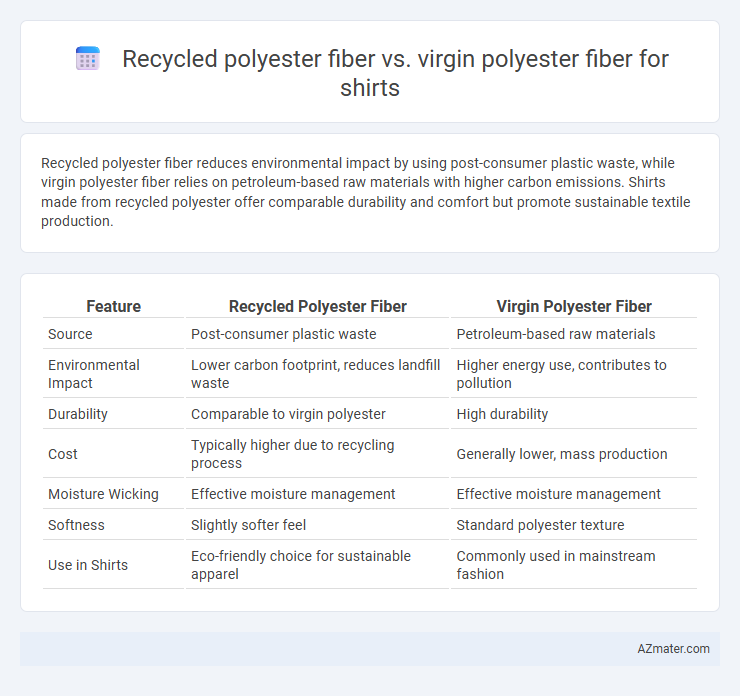Recycled polyester fiber reduces environmental impact by using post-consumer plastic waste, while virgin polyester fiber relies on petroleum-based raw materials with higher carbon emissions. Shirts made from recycled polyester offer comparable durability and comfort but promote sustainable textile production.
Table of Comparison
| Feature | Recycled Polyester Fiber | Virgin Polyester Fiber |
|---|---|---|
| Source | Post-consumer plastic waste | Petroleum-based raw materials |
| Environmental Impact | Lower carbon footprint, reduces landfill waste | Higher energy use, contributes to pollution |
| Durability | Comparable to virgin polyester | High durability |
| Cost | Typically higher due to recycling process | Generally lower, mass production |
| Moisture Wicking | Effective moisture management | Effective moisture management |
| Softness | Slightly softer feel | Standard polyester texture |
| Use in Shirts | Eco-friendly choice for sustainable apparel | Commonly used in mainstream fashion |
Introduction: Overview of Polyester Fibers in Shirt Manufacturing
Polyester fibers serve as a cornerstone in shirt manufacturing due to their durability, wrinkle resistance, and affordability. Recycled polyester fiber, produced from post-consumer plastic waste, offers an eco-friendly alternative to virgin polyester fiber derived from petroleum-based raw materials. The shift towards recycled polyester reduces carbon footprint and conserves non-renewable resources while maintaining the performance standards essential for quality shirts.
What is Virgin Polyester Fiber?
Virgin polyester fiber is a synthetic fiber produced directly from petrochemical raw materials without any prior use or recycling. It offers consistent quality, strength, and durability, making it ideal for high-performance shirts requiring long-lasting wear and vibrant color retention. Unlike recycled polyester fiber, virgin polyester does not incorporate reclaimed materials, ensuring purity and uniformity in textile production.
What is Recycled Polyester Fiber?
Recycled polyester fiber is a type of polyester made from post-consumer plastic waste, such as PET bottles, which are melted down and spun into new fibers, reducing reliance on fossil fuels and minimizing landfill waste. Compared to virgin polyester fiber, which is produced from petroleum-based raw materials, recycled polyester requires less energy and lowers carbon emissions during manufacturing. This sustainable alternative maintains similar durability and moisture-wicking properties, making it ideal for eco-friendly shirts without compromising performance or comfort.
Environmental Impact: Virgin vs. Recycled Polyester
Recycled polyester fiber significantly reduces environmental impact compared to virgin polyester by using post-consumer plastic waste, lowering carbon emissions by up to 75% and conserving non-renewable petroleum resources. Virgin polyester production requires extensive fossil fuel extraction, generating higher greenhouse gas emissions and consuming more water and energy throughout manufacturing. Choosing recycled polyester for shirts supports waste reduction and circular economy practices, contributing to more sustainable textile production.
Production Process: Comparing Virgin and Recycled Polyester
Recycled polyester fiber is produced by melting down post-consumer plastic bottles or textile waste, significantly reducing the need for petroleum-based raw materials compared to virgin polyester fiber, which is derived from petrochemical compounds through polymerization processes. The production of recycled polyester consumes less energy and water, making it more environmentally sustainable, whereas virgin polyester involves higher carbon emissions and resource depletion due to extraction and refining of crude oil. Both fibers undergo similar spinning and weaving techniques for shirt manufacturing, but recycled polyester contributes substantially to waste reduction and lower ecological footprints in textile production.
Performance & Durability: Which Fiber Lasts Longer?
Recycled polyester fiber demonstrates comparable durability to virgin polyester fiber, maintaining high tensile strength and resistance to abrasion essential for long-lasting shirts. Virgin polyester typically exhibits slightly higher resilience under extreme wear conditions, but advances in recycling technology have significantly narrowed the performance gap. Both fibers offer excellent moisture-wicking properties and color retention, ensuring shirts retain their shape and appearance after prolonged use.
Comfort and Aesthetics: Feel and Look of Both Fibers
Recycled polyester fiber offers comparable softness and breathability to virgin polyester, making it equally comfortable for shirts while contributing to sustainability. Both fibers provide a smooth, wrinkle-resistant texture with vibrant color retention, ensuring shirts look sharp and maintain their visual appeal over time. Slight variations in hand feel may occur, but advances in recycling technology have minimized differences, allowing recycled polyester shirts to match the high-quality appearance and comfort of virgin polyester garments.
Cost Differences: Price Comparison & Market Trends
Recycled polyester fiber typically costs 10-30% more than virgin polyester fiber due to additional processing and collection expenses but benefits from growing demand for sustainable textiles driving price competitiveness. Market trends indicate increased investment in recycling technologies and regulatory incentives are narrowing the cost gap, with eco-conscious brands willing to pay a premium for reduced environmental impact. Price comparisons reflect fluctuating raw material costs, yet recycled polyester's price stability is often higher thanks to less dependence on fossil fuel markets.
Sustainability: Eco-Friendly Considerations for Shirts
Recycled polyester fiber for shirts significantly reduces environmental impact by diverting plastic waste from landfills and oceans, lowering greenhouse gas emissions compared to virgin polyester. Production of recycled polyester consumes less energy and water, contributing to a smaller carbon footprint while maintaining similar durability and comfort as virgin fibers. Choosing recycled polyester shirts promotes a circular economy, making them a more sustainable and eco-friendly textile choice.
Which Fiber is Better for Shirt Production?
Recycled polyester fiber offers significant environmental benefits by reducing plastic waste and lowering carbon emissions compared to virgin polyester fiber, making it a more sustainable choice for shirt production. Virgin polyester fiber typically provides slightly better fabric strength and consistency, which can translate to higher durability and smoother texture in shirts. However, advancements in recycled polyester technology are closing this quality gap, positioning recycled fibers as both eco-friendly and increasingly competitive in performance for high-quality shirt manufacturing.

Infographic: Recycled polyester fiber vs Virgin polyester fiber for Shirt
 azmater.com
azmater.com